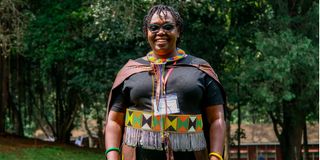Maputo Protocol@20: Celebrating rights groups, activists pushing gender equality

Monicah Yator, the founder of Indigenous Women and Girls initiative. She is among those who were awarded during celebrations held in Nairobi to mark Maputo Protocol 20th anniversary.
What you need to know:
- Two Kenyan rights groups and two activists were feted during the commemoration of the 20th anniversary of the Protocol to the African Charter on Human and Peoples’ Rights on the Rights of Women in Africa, Maputo Protocol.
- They include Association of Women in Agriculture Kenya, Coalition on Violence against Women, Monica Yator and Caroline Awuor Agwanda.
- Monica was recognised for her impactful work of transforming women’s lives through kitchen gardens.
In 2019, Monicah Yator, started Indigenous Women and Girls Initiative with a mission to save lives.
From her prior interaction with the local chiefs in Baringo County, Monicah had discovered husbands were battering their wives for lack of food at home. She had to take action and curb the prevalence of domestic violence.
“I started to popularise uptake of kitchen gardens so the women would grow enough to feed their families and have a surplus to sell to meet other needs,” she says.
She started with 21 women in groups in Baringo Central Sub-county in Baringo County. The women would collectively grow indigenous vegetables and tomatoes. Whatever was harvested was shared among themselves for home use and sale.
Kitchen farming
Now, more than 400 women have adopted kitchen farming, having expanded to two more sub-counties namely Mogotio and Baringo South.
“The women have gained confidence because they are empowered,” she says.
“The women were beaten down because they would not provide for their families. But these days they speak up during meetings. It is a powerful and encouraging transition,” she says.
Because of this impactful work of transforming women’s lives through kitchen gardens, Solidarity for African Women’s Rights (Soawr) feted Monicah on July 11, during the commemoration of the 20th anniversary of the Protocol to the African Charter on Human and Peoples’ Rights on the Rights of Women in Africa, popularly known as the Maputo Protocol.
She was among the 20 women rights groups and champions awarded 20 for 20 Solidarity Awards during the event in Nairobi. The awards were an initiative of Soawr and Equality Now.
Apart from Monicah, two Kenyan rights groups and one activist were feted. They were Association of Women in Agriculture Kenya (Awak), Coalition on Violence against Women (Covaw) and Caroline Awuor Agwanda.
The awards celebrated gender equality actors who have made exceptional contributions towards the promotion and uptake of the Maputo Protocol at national, regional, and continental levels.
Awak
Awak economically empowers vulnerable women in urban slums through innovative training programs such as urban farming, baking, briquette making. It has since empowered 5, 000 women in urban slums in coastal areas and Nairobi County, with the respective skills.
In an earlier interview, Judy Matu, Awak national executive chairperson, said as a donor-funded organisation, they can only do as much as the availed resources can stretch, yet the demand for the vertical farming skills is huge.
“The need for our services is huge. After every training, you get so many people coming to us (asking) ‘why are you only training these few? Why can’t you come to our place’,” she said.
Covaw

Coalition on Violence Against Women (Covaw) Executive Director Wairimu Munyinyi Wahome after she won in the Inclusion and Diversity Category during the 20 for 20 Solidarity Awards held at Movenpick Hotel on July 11, 2023.
Covaw, a national anti-gender based violence (GBV) organisation has since 1995, pushed for a transformative response to GBV. It has been vocal about delayed justice for survivors.
Last year, it launched a report Delayed & Denied: Legal and Administrative Bottlenecks to Effective and Efficient Delivery of Justice for Survivors of GBV, which showed more than 50 per cent of GBV cases take more than four years to be concluded.
Caroline
Caroline was recognised for her work in championing for the rights of women and girls with disabilities.
Through her activism, she has empowered more than 500 women with disabilities to start businesses.
During the ceremony, Equality Now, global executive director, Mona Sinha, challenged the activists to remain relentless in the push for gender equality.
“Now it is time for the rest of the world to sit up and listen,” she said.
“What has been achieved under the Maputo Protocol over the past 20 years has shown that meaningful progress towards gender equality is underpinned by three things; an ambitious, well-defined vision; strong, strategic leadership; and effective, multi-sectoral collaboration,” she observed





